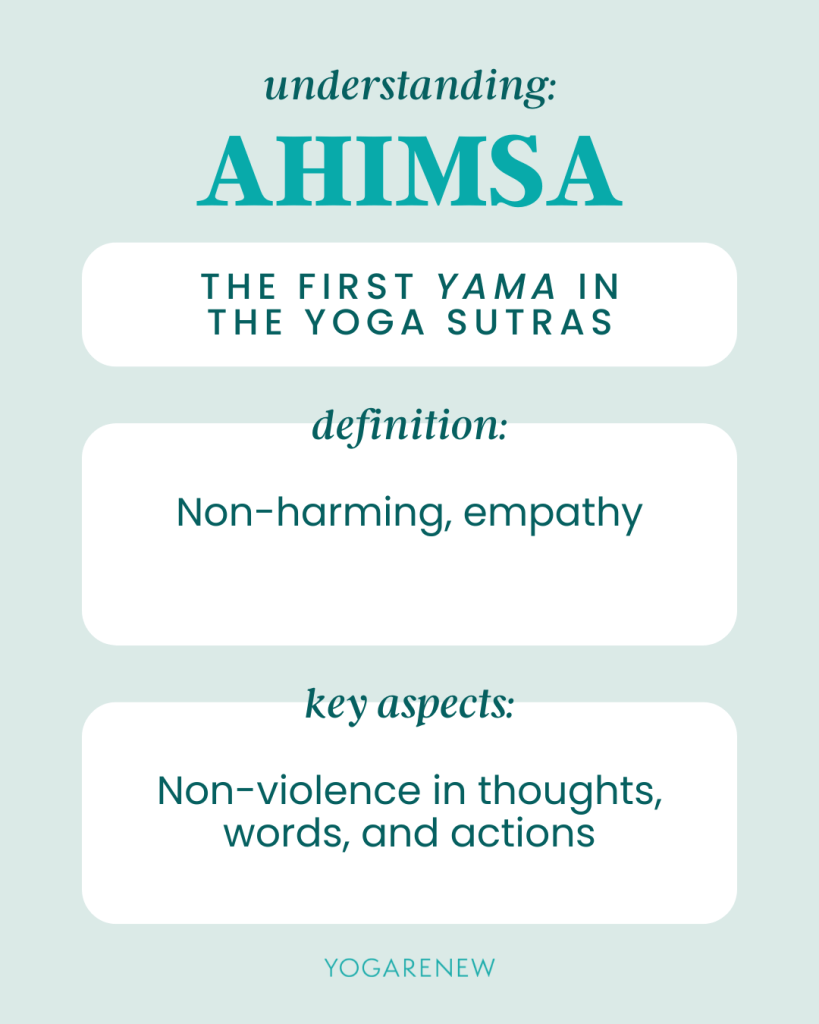
Ahimsa, often translated as “non-violence” or “non-harming,” is a central tenet in yoga philosophy and a vital part of the first Yama in the Yoga Sutras of Patanjali. But what does ahimsa really mean in everyday life and in your yoga practice? In this article, we’ll explore the deeper meaning and definition of ahimsa, how it relates to your personal growth, and how you can practice it both on and off the mat.
This post is the first stop in our series on the Yamas and Niyamas, so keep reading at the bottom to move through these powerful principles. Now, lets dig into Ahimsa!
Ahimsa & The Yoga Sutras of Patanjali
Before we get into the meaning of ahimsa as a standalone principle, it’s important to provide some context for its place within the yoga sutras. The Yoga Sutras of Patanjali is a collection of principles or aphorisms written by Sri Patanjali. The exact date of publication is unknown, but it is thousands of years old. There are nearly 200 sutras in total, traditionally split into 4 different books.
The most referenced and well-known of these are the 8 limbs of yoga, which are 8 stages or ‘limbs’ of yoga. These are introduced in book 2, sutras 29 (2.29) and are as follows:
- Yamas – Abstinences
- Niyamas – Observances
- Asanas – Postures
- Pranayama – Breath control or regulation
- Pratyahara – Withdrawal of senses
- Dharana – Concentration
- Dhyana – Meditation
- Samadhi – Absorption, liberation
Contemporary yoga often focuses on the asanas, or postures however the 8 limbs provide a robust path to enlightenment. The first 2 of these limbs are the Yamas and Niyamas.
The Yamas and Niyamas
The yamas and niyamas provide a set of ethical guidelines and are often discussed together. The yamas are a set of avoidances or restraints while the niyamas provide a set of virtuous habits. They could be thought of as simply “Do’s” and “Don’ts.” The Yamas and Niyamas are as follows:
Yamas
- Ahimsa – Nonviolence
- Satya – Truthfulness
- Asteya – Non-stealing
- Brahmacharya – Celibacy, Chastity
- Aparigraha – Non-attachment, non-possessiveness
Niyamas
- Saucha – Cleanliness, purity
- Santosha – Contentment, Satisfaction
- Tapas – Discipline, Austerity
- Svadhyaya – Self-study, self-reflection
- Isvara Pranidhana – Dedication to a higher power
Ahimsa is the first of the yamas, and thus the beginning of the 8 limbs. Yoga sutra 2.35 highlights the principle of ahimsa :
Yoga Sutra 2.35:
ahimsa pratisthayam tat samnidhau vaira tyagah
When we are fully steeped in peacefulness, all hostilities cease.
What Is the Meaning of Ahimsa in Yoga?
Ahimsa comes from the Sanskrit root “hims,” meaning “to strike.” When we add the “a” prefix, it negates the action, making ahimsa translate to “non-harming” or “non-violence.” So we should avoid being violent toward others? Seems simple enough.
When we think of violence, we often think of physical violence. Maybe even verbal violence. This concept extends beyond physical violence though. The principle of ahimsa includes avoiding harm in thoughts, words, and actions to all living beings. This includes harm to ourselves as well as those around us. The true essence of ahimsa is about cultivating love and compassion, both for ourselves and others, and living with a sense of mindfulness in how we interact with the world. Lets take a look at how this principle can be practiced…

Ahimsa Definition: How to Practice Non-Harming Daily
In practical terms, the definition of ahimsa asks us to be mindful of the impact we have on ourselves and the world around us. Practicing ahimsa isn’t limited to refraining from physical violence—it includes being conscious of our thoughts, emotions, and how we communicate. When we view this principle from that perspective, we gain better insight on how it can be put into action. Here are some ways to incorporate ahimsa into your daily life:
- Self-Compassion: Start with yourself. Practicing non-harming means letting go of self-criticism and judgment. Replace harsh inner dialogue with kindness and compassion. Internal feelings manifest external actions. Fill yourself with positivity.
- Awareness of Thought: Thoughts arise without provocation. It is up to us how we process and direct these thoughts. With awareness of our thoughts, we gain better control over how we react to them. Yoga sutra 2.33 states: “When disturbed by negative thoughts, opposite (positive) ones should be employed.” With awareness of negative thoughts, we open the door to invite positive thoughts.
- Mindful Speech: Be aware of the words you use. Ahimsa encourages you to speak in ways that uplift and encourage others rather than cause harm or spread negativity.
- Actions with Intention: Ensure that your actions, even small ones, are done with the intent of kindness and support. This could mean volunteering, being mindful of your consumption habits, or even practicing non-harming toward the environment.
Many yogis practice ahimsa by avoiding foods and products that cause harm to animals. Some take this even a step further, taking precaution to avoid harming plant life or insects. Jain monks are an example of a religious sect that strictly adhere to the concept of non-harm across all living beings.
There are many ways this principle can be incorporated into your life but the core modes of practice listed above provide a central framework to start from. Ahimsa is a principle of intention. With good intentions, we begin our journey of nonharming. Now, lets look at how this principle translates into our yoga practice.
Ahimsa in Yoga Practice: Cultivating Compassion on the Mat
Ahimsa is especially relevant in your yoga practice. It asks you to approach your body with kindness, patience, and acceptance. Rather than pushing yourself to the point of pain or frustration, ahimsa encourages you to listen to your body and honor its limits. If inactivity causes harm to the body, then the simple act of practicing asana can be thought of as ahimsa in action. Here are some ways you can practice ahimsa on the mat:
- Gentle Transitions: Move with care between postures, avoiding abrupt or forceful movements that could strain your body.
- Non-Judgment: Let go of any judgment toward yourself or others during practice. Remember that yoga is about inner growth, not comparison.
- Respect for Your Limits: Accept where your body is today. Avoid pushing yourself into poses that could cause injury and instead focus on the breath and being present.
Ahimsa reminds us to escape negative thoughts of ourselves. This includes judgement of ourselves, or our abilities. We learn to invite acceptance into our practice and respect the boundaries of our body.
Ahimsa in Relationships
Ahimsa nurtures harmonious relationships by fostering empathy, understanding, and respect. In our interactions with others, practicing Ahimsa can lead to:
- Deeper Connections: By listening with empathy and responding with kindness, we can strengthen our bonds with loved ones and create a supportive community.
- Conflict Resolution: Approaching conflicts with a mindset of non-violence helps us find peaceful and constructive solutions, promoting mutual understanding and respect.
Embracing Ahimsa cultivates inner peace and emotional well-being. By letting go of anger, resentment, and judgment, we create space for compassion and love to flourish. This inner transformation can have a profound impact on our overall happiness and sense of fulfillment.
The Fruit and Benefits of Ahimsa
Each of the yamas and niyamas come with their own benefits, or ‘phala sruti’ (fruit). The ‘fruit’ of ahimsa is stated in the full sutra 2.35: “When we are fully steeped in peacefulness, all hostilities cease.”
Can you think of a time when you’ve been in the presence of someone who had negative energy and how they impacted their environment? How about a time when you’ve been in the room with someone who exudes positivity? How did they impact the environment? We’ve all experienced a scenario where a positive person influenced a positive environment or a negative person influenced a negative environment.
From this perspective, the benefits of ahimsa expand beyond ourselves. It can create a ripple effect that impacts our entire environment. In line with the law of karma, we reap positivity by sowing positivity. The yoga sutras state this succinctly: ‘all hostilities cease.’
The benefits of Ahimsa include:
- Inner-peace
- Compassion
- Healthier Relationships
- Acceptance of ourselves and others
- Recognition of negative thought patterns
- Confidence
Incorporating Ahimsa into our yogic practice and daily lives is a journey of continuous learning and growth. It invites us to be more mindful, compassionate, and kind, not only to others but also to ourselves. As we deepen our understanding and practice of Ahimsa, we move closer to the true essence of yoga—union, harmony, and peace.
By embracing Ahimsa, we can create a ripple effect of positivity and non-violence in the world, inspiring others to join us on this transformative path. Let Ahimsa guide you both on and off the mat, fostering a life of compassion, connection, and inner tranquility.
Start Practicing Ahimsa Today
The true meaning of ahimsa goes beyond the physical practice of non-violence—it’s a way of living with kindness, compassion, and mindfulness in everything we do. By understanding and applying the definition of ahimsa, we can cultivate a more peaceful and intentional life, both on and off the mat.
Take your understanding of ahimsa to the next level by subscribing to our Ether app. You’ll get exclusive access to an in-depth online workshop on the Yamas and Niyamas, led by Julie Pasqual. Dive deep into the wisdom of yoga philosophy, learn how to incorporate these teachings into your daily life, and elevate your practice. Subscribe to the Ether app today and start your journey toward a more mindful and compassionate way of living.
Continue Reading…
Continue this series on the Yamas and Niyamas and explore the next Yama Satya
Take a Journey Through the Yamas/Niyamas
Enhance your spiritual journey with incredible insight on the Yamas/Niyamas in Julie Pasqual’s immersive and transformative online course. Get started for free, and gain access to YogaRenew’s Ether app with all of our workshops, classes, series and live events.











